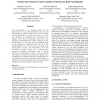Free Online Productivity Tools
i2Speak
i2Symbol
i2OCR
iTex2Img
iWeb2Print
iWeb2Shot
i2Type
iPdf2Split
iPdf2Merge
i2Bopomofo
i2Arabic
i2Style
i2Image
i2PDF
iLatex2Rtf
Sci2ools
103
click to vote
HICSS
2005
IEEE
2005
IEEE
Vicious and Virtuous Cycles in Global Virtual Team Role Coordination
Role coordination is an important aspect of task performance in teams. This phenomenon has received little attention in global virtual teams (GVT) with their coordination hurdles. An exploratory study of two GVT was conducted to investigate role coordination. Our findings reveal that role ambiguity may lead to the emergence of individual roles in GVT contingent on task interdependency. In particular, high role ambiguity leads to the emergence of individual roles when GVT task interdependency is low but not so when it is high. These factors form a vicious cycle that hampers GVT role coordination. Another vicious cycle is formed when personal coordination mechanisms result in uneven distribution of information. Virtuous cycles are formed when group coordination mechanisms aid effective role coordination, preventing the emergence of individual roles and building shared team interaction mental models. In addition to vicious and virtuous cycles, we also identified technical roles as being ...
Biometrics | Coordination Mechanisms | HICSS 2005 | Individual Roles | Role Coordination | System Sciences |
| Added | 24 Jun 2010 |
| Updated | 24 Jun 2010 |
| Type | Conference |
| Year | 2005 |
| Where | HICSS |
| Authors | Juliana Sutanto, Chee Wei Phang, Huei Huang Kuan, Atreyi Kankanhalli, Bernard C. Y. Tan |
Comments (0)

